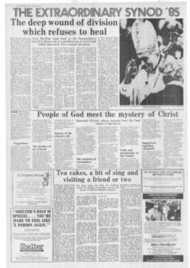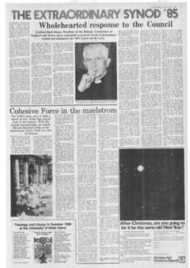Page 4, 13th December 1985
Page 4

Report an error
Noticed an error on this page?If you've noticed an error in this article please click here to report it.
Tags
Share
Related articles
Putting The Synod In Perspective
Wholehearted Response To The Council
A Dearth Of Pointers To Growth And Renewal
The Redeemer Of Man
The Daunting Experience Of Being A Synod Father
People of God meet the mystery of Christ
Desmond O'Grady selects extracts from the final report of the Synod
• • • UNANIMOUSLY
we have celebrated the second Vatican Council as a grace of God and a gill of the Holy Spirit, from which have come forth many spiritual fruits for the Universal Church and the particular churches, as well as for the men of our time. Unanimously and joyfully we also verify that the Council is a legitimate and valid expression and interpretation of the deposit of faith as it is found in sacred scripture and in the living tradition of the Church. Therefore we are determinded to progress further along the path indicated to us by the Council
Suggestions
It is suggested that a pastoral programme be implemented in , the particular churches for the years to come, having as its objective a new, more extensive and deeper knowledge and reception of the Council. This can be attained above all through a new diffusion of the documents themselves, through the publication of studies that explain the documents and bring them closer to the understanding of the faithful.
The conciliar doctrine must be proposed in a suitable and continued way by means of conferences and courses in the permanent formation of priests and seminarians, in the formation of men and women religious, and also in the catechesis of adults. Diocesan synods and other ecclesial conferences can be very useful for the application of the Council. The opportune use of the means of social communion of the Council. The opportune use of the means of social communication (mass media) is recommended.
The mystery of the Church
The whole importance of the Church derives from her connection with Christ. The Council has described the Church in diverse ways: as the People of God, the body of Christ, the bride of Christ, the temple of the Holy Spirit, the family of God. These descriptions of the Church complete one another, and must be understood in the light of the Mystery of Christ or of the Church in Christ. We cannot replace a false unilateral vision of the Church as purely hierarchical with a new sociological conception which is also unilateral.
Sources of the Church's life
THEOLOGY according to the well-known description of St Anselm, is "faith seeking understanding". Since all Christians must account for the hope that is in them (cf 1 Pt 3:15), theology is specifically necessary to the life of the Church today. With joy we recognise what has been done by theologians to elaborate the documents of Vatican Council II, and to help towards their faithful interpretation and fruitful application in the postconciliar period.
But on the other hand, we regret that the theological discussions of our day have sometimes occasioned confusion among the faithful. Thus, communication and a reciprocal dialogue between the bishops and theologians are necessary for the building up of the faith and its deeper comprehension.
Very many have expressed the desire that a catechism or compedium of all Catholic doctrine regarding both faith and morals be composed, that it might be, as it were, a point of reference for the catechism or compendiums that are prepared in the various regions. The presentation of doctrine must be biblical and liturgical. It must be sound doctrine suited to the present life of Christians.
The meaning of communion
THE ecclesiology of communion is a central and fundamental idea of the
Council's documents. Koinonia communion, founded on the sacred scripture, have been held in great honour in the early Church and in the oriental churches to this day. Thus, much was done by the second Vatican Council so that the Church as communion might be more clearly understood and concretely incorporated into life.
What does the complex word "communion" mean? Fundamentally it is a matter of communion with God through Jesus Christ, in the Holy Spirit. This communion is had in the word of God and in the sacraments. Baptism is the door and the foundation of Communion in the Church, The Eucharist is the source and the culmination of the whole Christian life. The Communion of the Eucharistic Body of Christ signifies and produces, that is, builds up, the intimate communion of all the faithful
in the body of Christ which is the Church (1 Cor 10:16).
For this reason, the ecclesiology of communion cannot be reduced to purely organisational questions or to problems which simply relate to powers. Still the ecclesiology of communion is also the foundation for order in the 1Church, and especially for a correct relationship between 'unity and pluriformity in the Church.
Unity and pluriformity in the Church
The unique and universal Church is truly present in all the particular churches, and these are formed in the image of the universal Church in such a way that the one and unique Catholic Church exists in and through the particular churches. Here we have the true theological principle of variety and pluriformity in unity, but it is necessary to distinguish pluriformity from pure pluralism. When pluriformity is true richness and carries with it fullness, this is true Catholicity. The pluralism of fundamentally opposed positions instead leads to dissolution, destruction and the loss of identity.
Suggestions regarding collegiality
Since the episcopal conferences are so useful, indeed necessary, in the present-day pastoral work of the Church, it is hoped that the study of their theological "status", and above all the problem of their doctrinal authority, might be made explicit in a deeper and more extensive way, keeping in mind what is written in the conciliar decree Christus Dominus and in the Code of Canon Law.
It is recommended that study be made to examine whether the principle of subsidiarity in use in human society can be applied to the Church, and to . what degree and in what sense such an application can and should be made.
The salvific mission of the Church in relation to the world must be understood as an integral whole. Though it is spiritual, the mission of the Church involves human promotion even in its temporal aspects. For this reason the mission of the Church cannot be reduced to a monism, no matter how the latter is understood. In this mission there is certainly a clear distinction — but not a separation — between the natural and the supernatural aspects.
The duality is not a dualism. It is thus necessary to put aside the false and useless appositions 'between, for example, the church's spiritual mission and Diaconia for the world.
blog comments powered by Disqus













